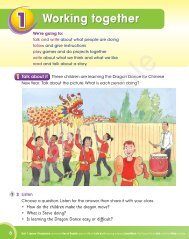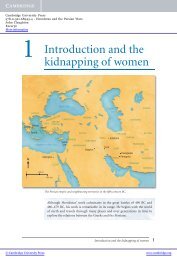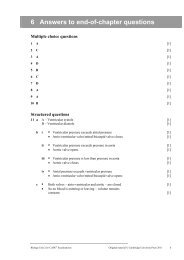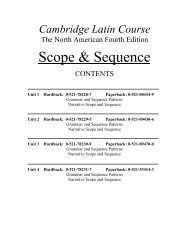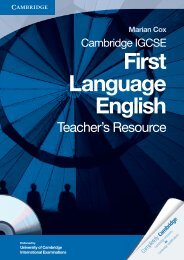Brad Philpot - Cambridge University Press
Brad Philpot - Cambridge University Press
Brad Philpot - Cambridge University Press
You also want an ePaper? Increase the reach of your titles
YUMPU automatically turns print PDFs into web optimized ePapers that Google loves.
3 Literature:<br />
texts<br />
and contexts<br />
Chapter 6 The context of<br />
composition<br />
Objectives<br />
By the end of this chapter you will be able to<br />
identify and discuss the characteristics of various types of novels<br />
appreciate the importance of literary movements in shaping the contexts<br />
in which texts are written<br />
plan and write a timed essay for your Paper 2 exam.<br />
In the last chapter you looked at various different approaches to literature and<br />
traditions of literary criticism. You saw that there are different contexts in which texts<br />
can be interpreted. In this chapter you are going to turn your attention to the different<br />
contexts of composition and explore more about the context in which some sample<br />
texts were composed. You will look at different types of novel first, in Unit 6.1, then at<br />
literary movements in Unit 6.2. At the end of the chapter you will find a sample Paper 2<br />
to study and will be able to see how the knowledge you gain in this chapter can be put<br />
into practice in your IB exam.<br />
Reading novels, watching plays or viewing films often prompts the question What<br />
was the writer thinking when writing this text? This question is at the heart of the context<br />
of composition. It can be broken down into two subsidiary questions:<br />
1 Which literary forms inspired the writer to shape the text in this particular way?<br />
2 What experiences, topics or ideas inspired the writer to write?<br />
The first question is one of genre. Prose, poetry and drama are easily identifiable<br />
categories, or genres, of literature. However, it should always be remembered that not<br />
every work of fiction will fit neatly into a literary category or subcategory. There is no<br />
reader’s handbook to help identify literary genres, unlike the handbooks that exist<br />
to help identify species of birds or flowers, for example. In Unit 6.1 you will discover<br />
several different types, or genres, of novel and the qualities that define each of them.<br />
Learning to identify the characteristics of different kinds of novel will help put your<br />
Part 3 texts into perspective.<br />
The second question relates to the literary, social, political or historical movements<br />
that have influenced the writer, which you will pursue further in Unit 6.2. Writers do<br />
not write in a vacuum. They are influenced by their surroundings and the trends of their<br />
times. The German word zeitgeist has been adopted in English to capture all of these<br />
factors and describe ‘the spirit of the times’.<br />
For centuries, great writers have ‘stood on the shoulders’ of other writers who have<br />
gone before them. In other words, good writers build on traditions that others have<br />
started. Studying writers’ texts in the context of different literary genres and movements<br />
will help you understand how they have built on traditions. It will also show you how<br />
their writing style and form have been influenced by this context.<br />
Sample<br />
© <strong>Cambridge</strong> <strong>University</strong> <strong>Press</strong> 2011<br />
Key<br />
terms<br />
Genre describes a category of<br />
literature that can be defi ned by the<br />
structural and stylistic conventions<br />
that are frequently found in that<br />
category.<br />
Movement, in a literary sense, is a<br />
collection of works which seek to<br />
address similar concerns or express<br />
similar ideas, or which come out of<br />
a certain period in history.<br />
137



